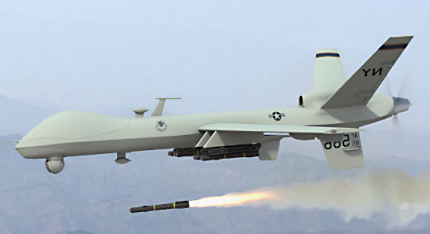New U.S. drone-sale policy also focused on economic security
The Obama administration's new export policy on armed UAS reflects a competitive international market for drone sales.

An MQ-1 Predator fires a Hellfire missile.
Mindful of a push by Chinese and Israeli manufacturers to pursue the emerging international market for military and commercial drones, the Obama administration moved this week to adjust U.S. export policies to permit the foreign sales of military unmanned aerial systems (UAS).
The decision is welcome news for key U.S. drone suppliers like General Atomics Aeronautical Systems Inc., maker of the MQ-1 Predator, a mainstay in the global war on terror, and MQ-9 Reaper drones. The San Diego-based company has recently been promoting new sense-and-avoid technology as it seeks to expand into the commercial market for such applications as border surveillance.
In announcing the arms export shift this week, the U.S. State Department cited both national and economic security justifications. "The United States has a responsibility to ensure that sales, transfers, and subsequent use of all U.S.-origin UAS are responsible and consistent with U.S. national security and foreign policy interests, including economic security, as well as with U.S. values and international standards."
While clearing the way for General Atomics and other U.S. drone makers to pursue international sales, U.S. officials noted that the new drone export policy comes with "stringent conditions" for sales or transfer of military drones.
For example, any sale or transfer would have to be funneled through government Foreign Military Sales programs spelled out in U.S. and allied export control regimes. The State Department also stressed that the new drone export policy maintains long-standing American commitments under the international Missile Technology Control Regime. UAS technology falls under the missile regime, according to the State Department, since drones like the Predator are capable of a range of at least 300 kilometers and can carry a payload of at least 500 kilograms.
The MQ-1 Predator drone carries AGM-114 Hellfire air-to-surface missiles that generally weigh about 45 kilograms, or about 100 pounds.
Explaining the implications of the new U.S. drone export policy, the State Department stressed that it provides a "disciplined and rigorous framework" for limiting drone sales and transfers while "enhancing the operational capabilities and capacity of trusted partner nations [and] increasing U.S. interoperability with these partners for coalition operations."
Export officials also stressed that the new export policy "ensures appropriate participation for U.S. industry in the emerging commercial UAS market, which will contribute to the health of the U.S. industrial base, and thus to U.S. national security which includes economic security."
NEXT STORY: New center to focus exclusively on cyber threats



